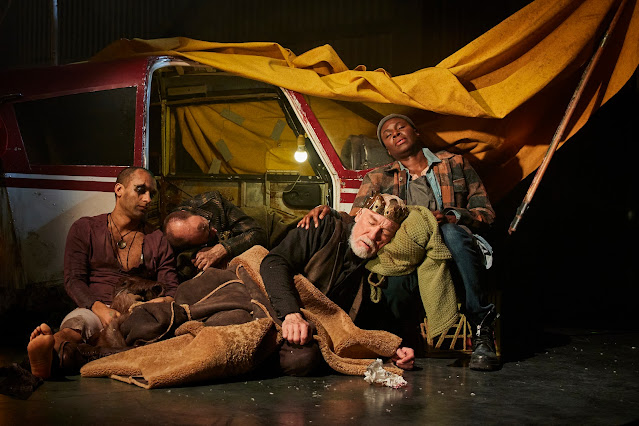King Lear, Shakespeare Theatre Company
I used to wonder if I would appreciate King Lear more once I had children. Maybe Lear's actions might make a little more sense if I understood his wounded fatherly pride. But then I would get so caught up in the early scenes of Lear's willfulness and constant need for attention and praise. One hundred knights? That's too many knights for any one person, and as a houseguest? Are you kidding me? Those daughters had a point and Lear could never truly win back my sympathy. Later, I wondered if I would appreciate Lear more as I grew older. The callousness of youth set against the grievances and follies of age! Surely, that was my way in. Yet, here I am 25 years after I first encountered the play and that's a big nope, if Lear chooses to make himself redundant in his own kingdom and family, maybe the younger generation has the right of it (at least, before we get to the eye gouging and civil war parts).
Enter Simon Godwin's production, now playing at the Shakespeare Theatre Company, with a new proposition. Maybe what's needed is a Lear that can speak directly to a quiet, anxious fear--not about kingdoms and crowns and hurricanoes, but how we treat the elderly and all that we lose when age takes a toll on our very minds and personalities.
With Patrick Page as the king, we have a Lear who's certainly ready to rage in his opening scenes, thundering first at Cordelia's (Lily Santiago) refusal to flatter him performatively, and then at Kent (a very welcome Shirine Babb), and earning the ire of his first host-daughter Goneril (Rosa Gilmore). Michael Milligan's Fool (also a very welcome return to STC) tries to make Lear understand the foolishness of his own actions, but it's no surprise Page's king isn't listening. While these early scenes are ably done, it isn't until Lear spends the night in the storm and suffers genuine betrayal and intense physical hardship that thing begin to take a turn in the production.
 |
| Photo of Matthew J. Harris, Michael Milligan, Patrick Page, and Shirine Babb in King Lear by DJ Corey Photography. |
Set designer Daniel Soule brings the first surprise into the previously sparsely furnished airport-hangar of the stage with Lear's refuge during the storm: a small downed plane. With Jeanette Oi-Suk Yew's lighting design bathing the plane's interior in what feels like the first warm-colored light of the entire production so far, it feels like the first real moment of care and rest, despite the dire circumstances.
The standout scenes come as we see Lear not gripped by a highbrow fantasy of madness, but beset by a genuine and recognizable dementia that feels all-too real. Page's towering presence becomes smaller, and by the time he lies in a hospital bed, asking where he is and how he got there, the immediacy of the moment is undeniable. Maybe I didn't need kids or to make it old age myself; maybe what I always needed was years of growing anxiety about my own parents' aging and autonomy.
 |
| Photo of Lily Santiago and Patrick Page in King Lear by DJ Corey Photography. |
There's a lot that really works in Godwin's production. Matthew J. Harris is a striking Edgar, and the desperate glance he makes out into the audience as he goes to help his grievously injured father (Craig Wallace) is a moment that will stay with me as much as the inhuman sound of Page's final howls. There are of course some elements that don't quite work; in Godwin's cut of the play, some of the clarity of the plot's action gets lost, and the modern costumes sometimes muddy waters they should be making clear.
The last time STC staged Lear, I wasn't a big fan. Its relentless nihilism felt like it lost what made Lear its own play, rather than a slog through sex, death, and misery that happened to be in iambic pentameter. Godwin's Lear, and notably, Page's Lear, feel more like what I've been craving. I have no doubt that its run will be celebrated, and with good cause. There's always so much talk about making Shakespeare relatable, but we don't find that by hastily tacking on new settings and snazzy costumes; audiences are smarter than we like to give them credit for sometimes. What makes Shakespeare relatable will always, always lie in performers who can find the truth and play it honestly, and Page gives us a masterful demonstration of exactly that.
Comments